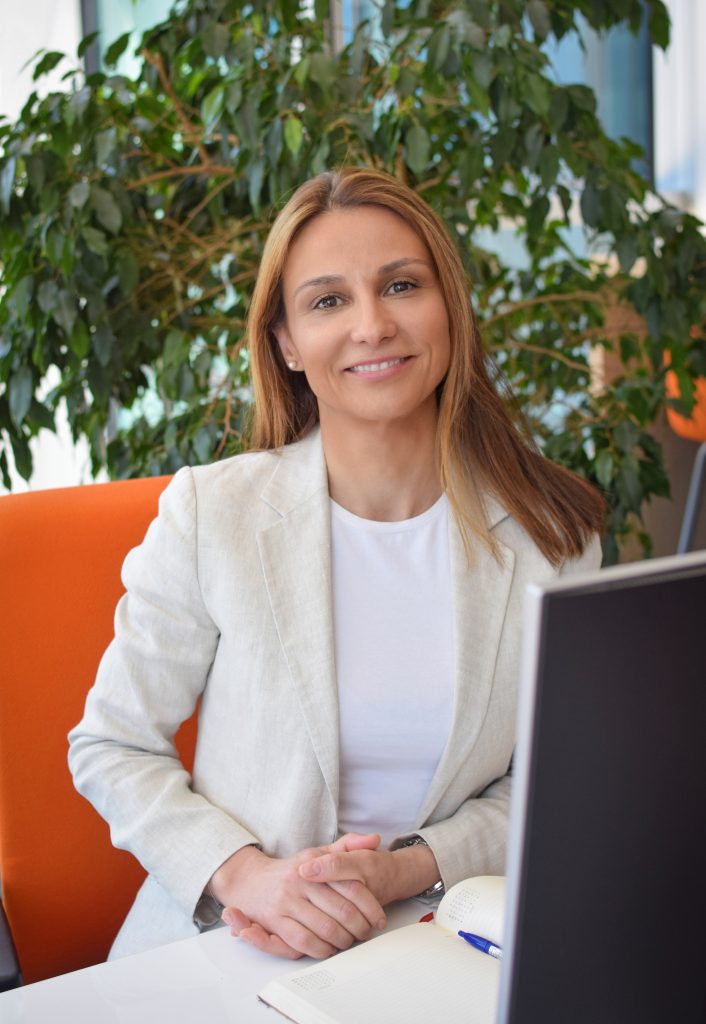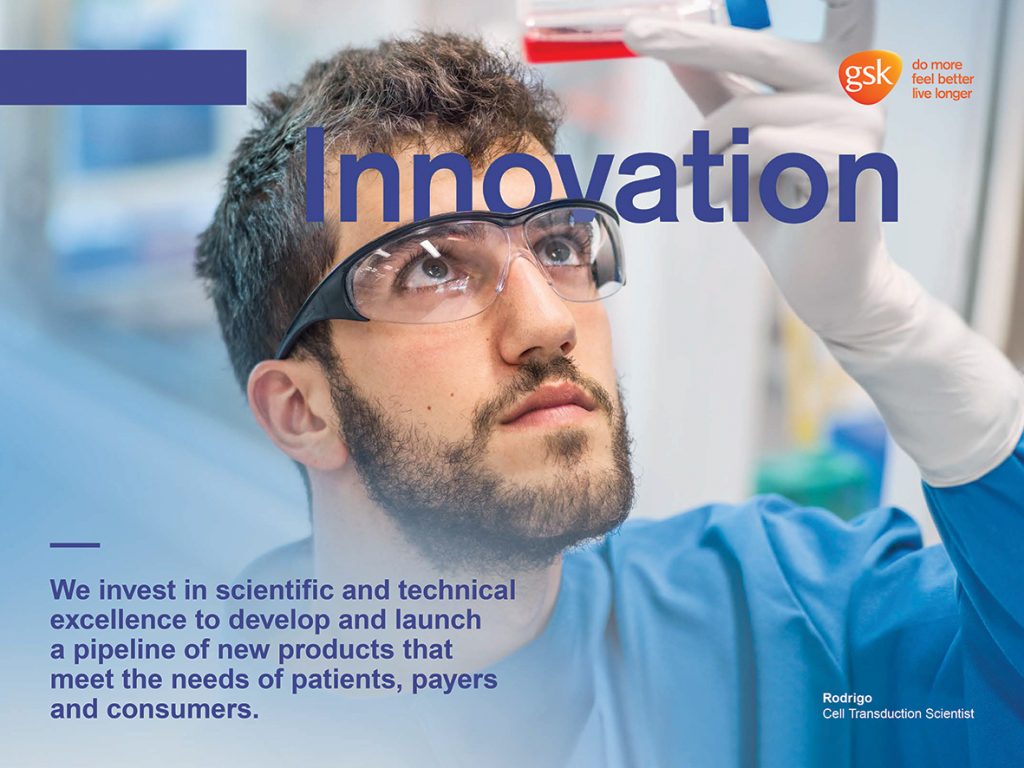Our purpose is to help people do more, feel better and live longer by using our science and technology to address health needs, making our products affordable and available to all of those in need, while creating an excellent working environment and being a modern employer.
As a global innovative pharmaceutical company, we research, manufacture, and make available a wide range of medicines, vaccines, and consumer healthcare products. 11,000 scientists in our global R&D team are using their expertise, the state-of-the-art technology, and our long scientific tradition to improve the quality of life of millions of people around the world, and find a cure for diseases for which there is no therapy today and support global efforts to tackle the COVID-19 pandemic.

GSK has a long tradition of finding solutions. What responsibility do you have as a leader in research and innovation?
Our purpose is to help people do more, feel better and live longer by using our science and technology to address health needs, making our products affordable and available to all of those in need, while creating an excellent working environment and being a modern employer.
GSK is a pioneer in innovation- We have developed the first vaccines against chickenpox and rubella, and today our portfolio consists of more than 30 vaccines helping to protect people against 21 diseases. The first drug used in HIV/AIDS therapy, the first medication specifically designed for the treatment of lupus were developed in GSK. Today, our research focuses on science related to the immune system and human genetics, while leveraging advanced technologies including functional genomics, artificial intelligence, and machine learning – all of this is driven by the multiplier effect of our Culture.
A functioning immune system is crucial to our health. If this network of cells stops working adequately it can lead to diseases that impact almost every area of medicine, such as cancer, respiratory illnesses like asthma and chronic inflammatory conditions such as arthritis. If we can gain a greater understanding of how the different parts of our immune system work when things go wrong and why it can lead to disease, we can potentially target the immune system to develop innovative new medicines.
The distinctive new approach to R&D, to focus on the immune system, the use of genetics, and advanced analytical technologies promise to deliver a more productive R&D organization delivering a higher number of differentiated medicines. At GSK, we have prioritized our research efforts into key focus areas that we believe offer the greatest potential to deliver transformational outcomes for patients- bringing innovation to Vaccines, HIV, Infectious diseases and global health, Immuno-inflammation, Oncology, and Respiratory. Rapid advances in science and technology are transforming healthcare, improving the probability of success in R&D, and may help accelerate the process of finding the right solutions.
We have a strong foundation in global health innovation, and this continues to play an important role. It’s also critical to ensure access and affordability of innovation for all patients in need. GSK is focused on making its products available through responsible pricing and strategic access programs and partnerships. We make continuous efforts to secure that patients in Serbia have access to the latest GSK innovative therapeutic options. We seek and offer adequate solutions using the most successful global experiences, encourage scientific debate and exchange of knowledge within the medical community, and adapt the pricing policy to the local market. It is encouraging to see that the state has made significant steps recently by expanding the list of innovative drugs, as well as extending the calendar of immunization, which improves the availability of modern therapy and vaccines and significantly contributes to the improvement of public health.
“We aim to bring differentiated, high-quality, and needed healthcare products to as many people as possible, with our scientific and technical know-how and talented people”
Could you tell us a bit more about your key focus areas what could we expect in the future?
We aim to bring differentiated, high-quality and needed healthcare products to as many people as possible, with our scientific and technical know-how and talented people. We invest in scientific and technical excellence to develop and launch a pipeline of new products that meet the needs of patients, payers, and consumers.
In our Vaccines business, we balance our focus on our robust pipeline of innovative candidate vaccines with the active life-cycle management of our existing vaccines, seeking to protect more people through expanded indications and geographies. Self-replicating mRNA (SAM), a technology that can help to make effective vaccines more quickly, can help with that. Once injected in the body, SAM molecule self-amplified and uses the mechanisms of the body’s own cells to produce the antigens of the disease pathogen. These antigens mimic an early-stage infection and trigger the body’s immune response, generating immune memory for future protection against the pathogen, but without causing disease. The human body becomes the factory for its own vaccine.

ViiV Healthcare, a company that was created by GSK and its partners, seeks to enhance local expertise and resources that build towards global goals including the WHO 90-90-90 target, as well as our own dedicated mission of leaving no person living with HIV behind. As a leader in HIV treatment, we are redefining the concept of antiretroviral therapy. We have managed to make available, for people living with HIV in Serbia, the most effective and recent therapeutic options, helping hundreds of people daily. In the near future, we expect new therapeutic options with better healthcare outcomes that will add additional value to public health and society.
What we expect from GSK in the future is a revolution in the administration of medicines for immunocompromised populations. We are working on a different formulation of parenteral drugs that would ensure the home care concept. Instead of coming to health care institutions for their therapy, patients will soon be able to receive it at home through self-administration thus minimizing the risk of infection.
For many years, GSK’s research and development has focused on using cutting-edge innovation to develop potential treatments for cancer patients. Developing a new medicine often takes several years. That’s why our strategic approach to R&D took advantage of the rapid advances in science and technology to identify novel targets, mechanisms, and potential medicines to fuel the next wave of innovative medicines for patients.
Continued advances in technology, combined with a greater understanding of science and the human body means that we can explore new breakthroughs and will aim to deliver them for some of the world’s biggest health challenges such as pandemics.
COVID-19 has radically changed lives around the planet and raised questions about the sustainability of the healthcare system and its readiness to respond to the most difficult and unforeseen challenges. Above all, we have seen the importance of innovation across all areas. In what ways did COVID influence your approach to innovation?
COVID-19 has influenced us in a way that we use technologies and innovations we have discovered in a different manner. Our adjuvant technology proven in pandemic influenza A virus, type H1N1, is now part of 6 different collaborations with the common cause of finding the vaccine against COVID-19, including unprecedented cooperation with Sanofi. This kind of partnership is bringing together two of the world’s largest vaccine companies, combining scientific expertise, proven technologies, capabilities, and the efforts of our people with the cause of developing an adjuvanted vaccine against coronavirus. From all collaborations we are taking part in, we intent to produce 1 billion doses of pandemic vaccine adjuvant system in 2021, to support the development of multiple adjuvanted COVID-19 vaccine candidates.4
“We have supported the use of information technology to deploy telemedicine and provide support to patients and health care providers, without risk of virus transmission”
We are reviewing our pipeline medicines to determine if any have potential activity against COVID-19 and have started a clinical trial to assess whether a monoclonal antibody in development can help treat patients who are affected by severe pulmonary COVID-19 related disease.
As a part of our daily operational activities, we have supported the use of information technology to deploy telemedicine and provide support to patients and health care providers, without risk of virus transmission. We have played a crucial role in supporting educational webinars for different specialities of healthcare professionals, where they had a chance to learn from key experts on how to manage and continue daily activities of providing health services in pandemic conditions. Our acknowledgement of protecting the risk population was demonstrated through the support given to patient web education during the pandemic peak.
Globally, we have donated $10 Million USD to WHO and the UN Foundation’s COVID-19 Solidarity Response Fund to prevent, detect, and manage the pandemic in support of frontline health workers.3 In Serbia, we have invested nearly 5 million RSD in our healthcare system by PPE donations, COVID-19 tests, consumer healthcare products donations, and web educations.
Since the outbreak, we have been actively exploring ways to help, with our science and expertise, alongside protecting the health and wellbeing of our people and managing our global supply chains to support patients and consumers who depend on our products. We work every day to make innovative therapeutic options equally available to all people, both in the world and in Serbia.